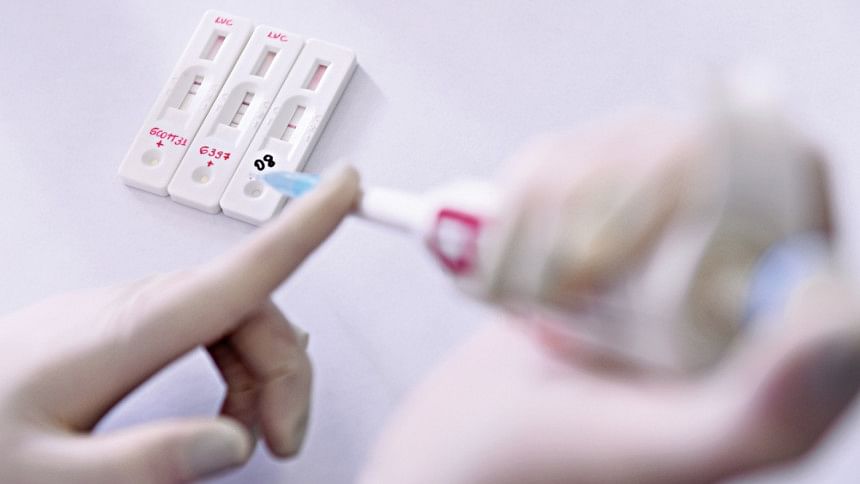5 Basic Medical Tests: Only 4pc hospitals can do them

Haemoglobin, blood glucose, urine protein, urine glucose, and urine pregnancy tests -- these are the five basic diagnostic tests that one can expect to be done at healthcare facilities across the country.
Yet a government survey, which was conducted in 2017 and whose final report was released in February this year, found that only four percent of healthcare facilities across the country offer all five tests at the same time. In the 2014 survey, this figure was three percent.
When the community clinics were excluded from the healthcare facilities, the percent stood at 12.
Of district- and upazila-level healthcare facilities, 14 percent provide all five basic tests. The figure has decreased from 16 percent in the 2014 survey.
The final report of the Bangladesh Health Facility Survey-2017 paints a dismal picture of the country's healthcare system.
The government of Bangladesh and the United States Agency for International Development (USAID) funded the survey, while ICF in the US provided technical assistance.
Aminul Hasan, director (hospitals and clinics) of the Directorate General of Health Services (DGHS), declined to accept the survey results.
"These are basic primary tests and most of the upazila health complexes have these facilities. So, I cannot accept the figure," he told The Daily Star.
This correspondent randomly contacted 10 upazila health complexes over phone and found only one of those with the capacity to do all the five basic tests.
Take for example Kalukhali Upazila Health Complex in Rajbari.
Khandaker Abu Jalal, upazila health and family planning officer, said the health complex was opened in 2018, but indoor facilities have still not yet been introduced. "We only do blood glucose test right now, nothing else."
Kamal Hossain, upazila health and family planning officer of Morrelganj Upazila Health Complex in Bagerhat, said they had no lab technicians for the past two and a half months. "So, we are not performing any tests right now."
Arafat Rahman, medical officer at Godagari Upazila Health Complex in Rajshahi, said, "We have the capacity to conduct all the basic tests. As there is a shortage of reagents, we cannot do some tests. Currently, we are not conducting pregnancy tests due to lack of kits."
Of the facilities The Daily Star contacted, only Badarganj Upazila Health Complex in Rangpur said it can perform all the five tests currently.
Ahmed Al-Sabir, an ICF consultant who worked for the survey, said, "We have observed the services, but did not identify the reasons. But I think one of the main reasons is that not all the facilities get the same supply of equipment and reagent materials."
Golam Kibria, medical officer at Babuganj Upazila Health Complex in Barishal, said they can currently perform all the basic tests except for the haemoglobin test.
Conducted by the National Institute of Population Research and Training, the survey covered 1,524 health facilities and 5,400 service providers from eight divisions.
Forty teams, led by physicians, collected data between July and October 2017.
The survey assessed public and private facilities with at least 20 beds, and non-governmental healthcare facilities in the formal sector that maintain widely accepted licensing, training, and policy standards.
"The capacity of health facilities to conduct basic diagnostic tests is still very limited. The most widely available test is blood glucose, provided by only 20 percent facilities. Only four percent facilities offer all the five basic diagnostic tests (haemoglobin, blood glucose, urine protein, urine glucose, and urine pregnancy tests)," the report said.
"Fourteen percent of district and upazila facilities and negligible proportions of union-level facilities and community clinics provide all five basic tests. More than half of private hospitals and 40 percent of non-governmental facilities offer the tests," it continued.
The report also stated that advanced laboratory diagnostic tests and equipment for diagnostic imaging were available only at district hospitals, upazila health complexes, NGO facilities, and private hospitals.
A majority of district hospitals (79 percent) have functional X-ray machines -- a slight improvement in the past three years.
Only 18 percent of upazila health complexes have functional X-ray machines -- this figure has decreased since 2014.
When it comes to regular availability of eight essential medicines mentioned below, the latest report showed a downturn.
It found 62 percent (38 percent when community clinics are excluded) of health facilities have at least six of the medicines in the drug and dietary supply (DDS) kit, compared to 77 percent (70 percent if community clinics are excluded) in 2014.
The DDS kit includes Amoxicillin tablets/capsules, Amoxicillin syrup, Paracetamol tablets, Paracetamol syrup, Tetracycline/chloramphenicol eye ointment, Cotrimoxazole, Iron tablets, and Vitamin A capsules.

 For all latest news, follow The Daily Star's Google News channel.
For all latest news, follow The Daily Star's Google News channel. 



Comments